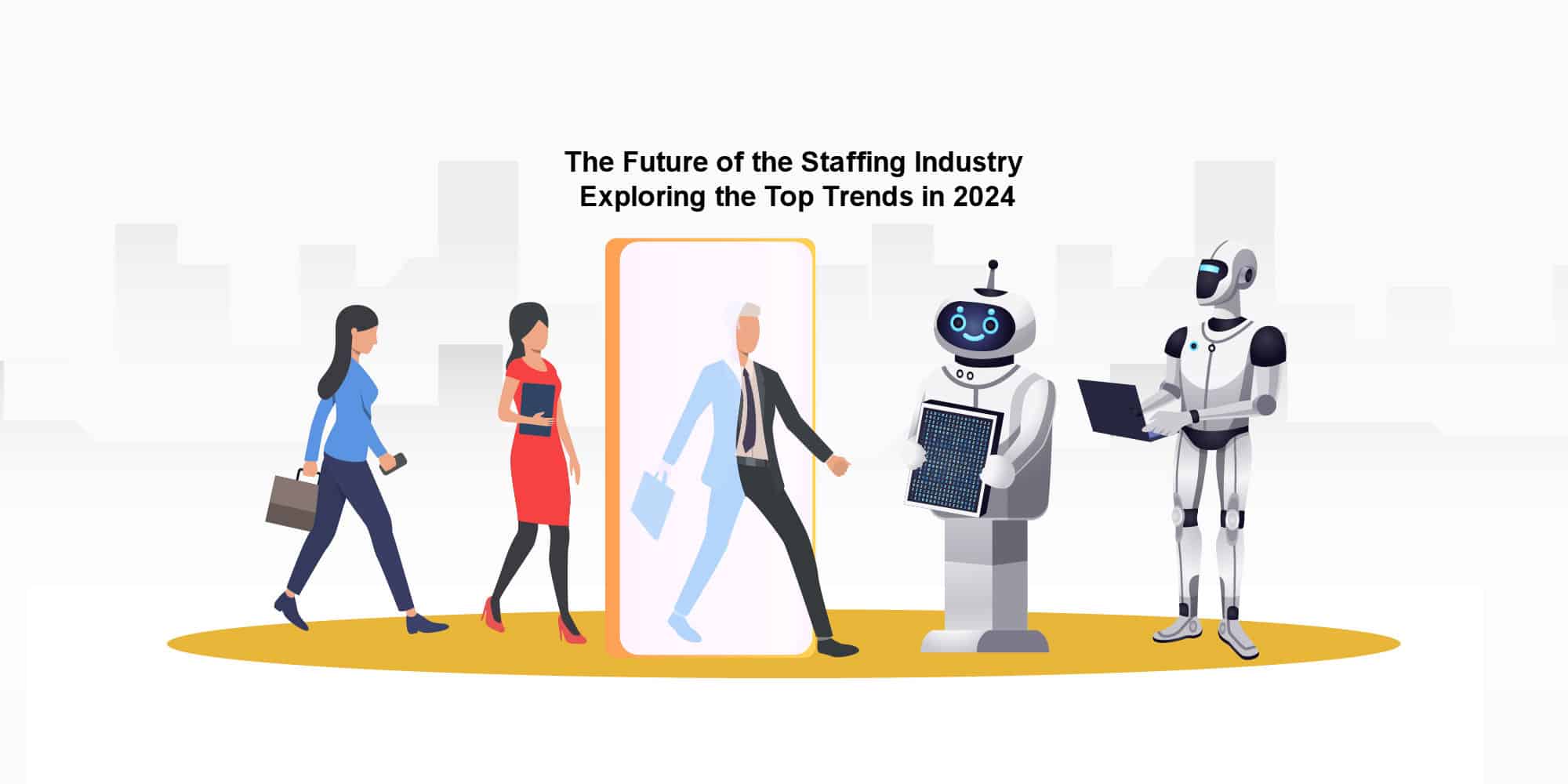Get ready for a sneak peek into what the future holds for the staffing industry! This article will reveal the trends that are set to influence the staffing landscape in 2024 as workplaces undergo changes, over time; it’s crucial for both staffing experts and businesses to be proactive and adjust to these new developments ahead of time.
In the year 2024 there will be changes in the staffing sector ahead of us. An important trend we will explore is the increasing popularity of remote work and the gig economy. Due to advancements and evolving preferences, among employees companies will depend more on freelancers and remote workers to fulfill their staffing requirements.
In addition to that point of view we will be investigating the impact of artificial intelligence (AI) and automation on the staffing process in the future ahead of us. The utilization of AI based systems for tracking applicants and automated chatbot interviews are poised to transform the recruitment procedures by simplifying and improving them significantly making them more effective and precise, in nature.
Moreover we will explore the rising significance of employer branding and workplace culture in luring top tier talent. In a job market that is becoming more and more competitive companies must find ways to set themselves apart and establish a work atmosphere to make an impression.
Come along as we explore the trends influencing the future of the staffing sector in 2024 and learn how to optimize your staffing approaches to stay competitive in this ever changing environment.
The influence of progress on the workforce sector.

The world of staffing is going through changes due to the rapid progress, in technology advancements we are witnessing today as we head into 2024. One noticeable shift is the growing influence of intelligence (AI) which is now being incorporated into different parts of the staffing operations.
Applicant tracking systems powered by AI are changing how companies find and assess candidates in groundbreaking ways. They can go through amounts of resumes efficiently by scanning for keywords to pinpoint the best suited candidates, for specific positions. This automated process not speeds up the screening process but also minimizes human biases resulting in more fair and effective hiring choices.
Furthermore chatbots powered by AI are becoming more common in the field of staffing. They manage the questions from candidates organize interviews and even carry out initial evaluations. These digital assistants offer an customized journey, for individuals looking for jobs. This also allows staffing experts to dedicate their time to strategic assignments.
The blending of augmented reality (VR/AR) technologies represents a rising trend reshaping the field of staffing services today. Applicants can engage in job simulations through this innovation enabling employers to evaluate their capabilities and compatibility, with company culture in a dynamic and authentic setting. This advancement not enriches the candidates journey but also offers significant insights into their skills and anticipated performance levels.
The surge of telecommuting and its impact, on workforce staffing
In 2024 for the staffing sector is the growing trend of work which has been greatly influenced by the COVID pandemic speeding up the acceptance of remote work setups and this change is expected to stay in place for a long time to come as firms adjust to this new norm with a rising need, for remote staffing services.
The opportunity to recruit individuals from around the globe has expanded the talent pool available to recruitment firms and employers significantly. This international pool of talent enables companies to tap into skills and knowledge that might not be easily found in their local areas. Moreover the adaptability of work has simplified the process for businesses to adjust their workforce size according to requirements, without being limited by location.
The emergence of work poses fresh hurdles for HR experts as well. It demands approaches and tools to foster communication, collaboration and engagement, among remote staff. Staffing firms must craft onboarding practices, virtual team building exercises and remote management tactics to back their clients and remote workforce effectively.
Moreover the move towards working has consequences on the conventional staffing structure that relies on physical office setups. Staff agencies might have to reconsider their office spaces by either reducing them in size or incorporating a strategy that blends remote and on site work. This change will demand preparation and adjustment to guarantee the ongoing prosperity of staffing firms, in this age of remote work.
The significance of having an inclusive workforce
In the changing landscape of the workforce todays world emphasizes the significance of diversity and inclusion among employees more, than ever before In the upcoming year 2024 businesses and recruitment firms should focus on establishing work settings that welcome people from various cultural backgrounds and ensure they feel valued and part of the team.
Incorporating a range of perspectives and experiences in the workplace has been proven to stimulate creativity and boost problem solving skills while also enhancing the success of a business operation By valuing individual differences, in their workforce selection strategies staffing companies can support businesses in forming teams that can effectively handle the intricacies of todays ever evolving business environment This encompasses embracing not just racial gender or ethnic diversity but also encouraging varied ways of thinking backgrounds and viewpoints.
It’s important to prioritize hiring methods in this situation. It’s essential for HR professionals to review their hiring and selection procedures to recognize and deal with any biases that may exist.This could mean introducing screening of resumes and offering training to manage unconscious biases for those involved in hiring decisions. Additionally to promote diversity it’s crucial to search for candidates, from marginalized communities.
In addition, to the recruitment process itself staffing firms should also prioritize the establishment of workplaces that nurture and empower employees from various backgrounds. This could involve implementing mentorship initiatives conducting training sessions on diversity and inclusion and guaranteeing that company policies treat everyone fairly and inclusively. By promoting an environment of belonging staffing agencies can assist their clients in retaining employees and achieving sustained success.
The lack of skills and the requirement, for further training and learning new skills.

With technology advancing these days the skills needed for various jobs are changing rapidly too. By 2024 staffing agencies will have to deal with the growing gap in skills among workers. To stay ahead in the game both staffing experts and their clients must focus on programs, for enhancing and learning skills.
The advancement of automation and AI powered technologies is set to shake up job roles by making certain skills outdated and sparking the need for fresh ones to emerge in demand. Recruitment firms will be required to keep up with these shifts by observing the changing skill demands, across different sectors and adjusting their approaches to recruiting top talent accordingly.
One strategy to tackle this issue involves creating training and educational initiatives to enhance the skills of employees through collaborations between staffing agencies and educational providers or industry professionals who provide opportunities for upskilling and reskilling services to their clients’ workforce members. This approach not aids in closing the skills gap but also boosts the perceived value of staffing agencies as reliable partners, in employee skill development.
Moreover employment agencies can utilize data driven information to recognize up and coming skill patterns and actively recruit personnel with the abilities. By making use of analytics and forecasting models they can predict future skill requirements and guarantee that their talent pool is prepared to satisfy the changing demands of their customers. This calculated strategy to talent management will be essential, in navigating the skills oriented environment of 2024.
The use of intelligence and automation, in recruitment procedures.
The incorporation of intelligence (AI) and automation in hiring procedures is expected to bring about significant changes in the industry by 2024. These innovations are anticipated to enhance facets of talent recruitment procedures. Starting from screening potential candidates all the way, to making the ultimate hiring choices.
AI powered tools for tracking are changing how staffing agencies and employers discover and assess potential candidates by swiftly sorting through numerous resumes to pinpoint the best fit, for specific positions.
In addition to screening resumes manually for job suitability or qualifications in the staffing industry sector; AI chatbots are now commonly used for various tasks like answering candidate questions and scheduling interviews efficiently through automation tools such as virtual assistants. These chatbots can also perform evaluations of potential candidates without human involvement and offer a tailored approach to job seekers during the hiring process. By leveraging this technology not only improves applicants overall experience but also gives recruitment experts more time to focus their efforts and attention, on highly qualified candidates effectively by reducing administrative tasks.
In addition to that AI and automation are also being used in the interview and evaluation process. Recruitment agencies can utilize AI tools to carry out interviews evaluate candidate answers and assess soft skills and cultural compatibility. The information derived from these data driven analyses can then be utilized to make hiring decisions that’re more informed and impartial thereby minimizing potential human biases and promoting a stronger alignment, between candidates and the job openings.
The evolving nature of the economy and independent freelance jobs.

The way people work is changing with freelancers and gig workers entering the scene each year – a trend that’s expected to pick up speed in 2024 as individuals look for flexibility and a better work life balance, through temporary and project based jobs.
Staffing firms must adjust their offerings and approaches to meet the needs of this expanding workforce sector by creating platforms or networks that link freelancers with term or project specific gigs efficiently and effectively; using these online platforms enables staffing companies to access a wide range of talented individuals looking for greater flexibility, in their work setups.
Moreover the rise of the economy and freelance work will compel staffing agencies to reconsider their staffing approaches. Of emphasizing permanent placements they must expand their services to encompass temporary contract and project specific staffing options. This adjustment will empower staffing agencies to cater to the changing requirements of their clients, who might seek more flexible and versatile workforce solutions to stay ahead in the competitive landscape.
Moreover the emergence of the economy will require a focus, on managing talent and engaging workers effectively. Temporary employment agencies will have to create efficient methods for welcoming, educating and assisting freelancers and gig workers to ensure they can make meaningful contributions, to their clients’ achievements. This could entail utilizing resources, virtual training initiatives and consistent communication and assistance to uphold an productive workforce.
The growing need, for workforce solutions.
In the evolving business environment, in 2024 and beyond the importance of staffing options will be on the rise. Businesses must be ready to adjust to market shifts, varying work demands and the call, for talents as projects arise. Agencies offering flexible and tailored workforce solutions are poised to meet this increasing need.
Flexible staffing solutions play a role, in adjusting the workforce size as required by businesses. With options like placements and project-based solutions provided by staffing agencies businesses can easily adapt to market changes. Manage workload fluctuations without the need for a sizable permanent workforce, on payroll.
Moreover; the increasing popularity of work and the gig economy is expected to boost the need, for workforce solutions even more significantly in the future ahead of us. To meet this demand effectively and efficiently; staffing agencies have the opportunity to utilize platforms and remote work setups as a means to connect companies with a range of skilled professionals from around the world. This approach enables businesses to harness talents and knowledge that may be scarce, within their geographic area.
In order to keep up with the increasing demand, for services todays clients want from staffing agencies must enhance their ability to plan and manage their workforce effectively by utilizing cutting edge tools like analytics and predictive modeling along with real time data to predict staffing requirements and actively recruit suitable candidates upfront.By providing tailored and flexible staffing solutions staffing agencies can establish themselves as allies, in their clients’ achievements.
The. Potential, for recruitment firms, in the year 2024.
In 2024 the staffing sector will face changes that bring both obstacles and chances for staffing firms to tackle head on in order to stay in the game and keep delivering quality services to their clients.
Staff agencies face a hurdle, in keeping up with the technology trends as AI and automation continue to evolve rapidly alongside digital platforms.They will have to make investments in tools and systems while also being cautious about how they adopt and integrate these technologies to improve operational efficiency without sacrificing the personal touch that is crucial, in the staffing sector.
One more obstacle they might encounter is the task of luring and keeping top notch employees within their organization itself as the call, for abilities and adaptable work structures rises steadily; staffing agencies will be up against rivals in the job market scene.Devising employee involvement and retention schemes alongside providing enticing career growth chances will play a role, in enabling staffing agencies to construct and sustain an efficient workforce.
Neverthelesṣ̣Ṡṁilȩaʳ changes, in the realm of staffinק agencies also offer potential for those agencies that’re forward thinkinק. By embracinק these trends and adjustinק their services accordingly staffing agencies can position themselves as valued partners, to their clients solutions that cater to the ever chan
Conclusion: Embracing the future of staffing
As we look ahead to 2024, the staffing industry is poised for a profound transformation. The trends we have explored – the impact of technological advancements, the rise of remote work, the importance of diversity and inclusion, the need for upskilling and reskilling, the integration of AI and automation, the changing dynamics of the gig economy, the demand for flexible staffing solutions, and the challenges and opportunities for staffing agencies – will collectively shape the future of the industry.
To succeed in this rapidly evolving landscape, staffing agencies and businesses must be proactive in embracing these trends and adapting their strategies accordingly. By staying ahead of the curve, leveraging the power of technology, and prioritizing the evolving needs of the workforce, they can position themselves for long-term success in the staffing industry of 2024 and beyond.
The future of staffing is brimming with possibilities, and those who are willing to embrace change and innovation will be well-equipped to thrive in this dynamic and exciting industry. As we move forward, the key to success will lie in the ability to anticipate and respond to the evolving needs of both clients and candidates, ultimately creating a more efficient, inclusive, and rewarding staffing landscape.


